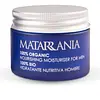What's inside
What's inside
 Benefits
Benefits

 Concerns
Concerns

 Ingredients Side-by-side
Ingredients Side-by-side

Butyrospermum Parkii Butter
Skin ConditioningHelianthus Annuus Seed Oil
EmollientOlea Europaea Fruit Oil
MaskingPrunus Amygdalus Dulcis Oil
Skin ConditioningSesamum Indicum Oil Unsaponifiables
EmollientSimmondsia Chinensis Seed Oil
EmollientRosa Canina Flower Extract
AstringentCitrus Limon Peel Oil
MaskingRosa Moschata Seed Oil
EmollientCymbopogon Martini Oil
MaskingPogostemon Cablin Leaf Oil
MaskingLinalool
PerfumingGeraniol
PerfumingLimonene
PerfumingFarnesol
PerfumingCitral
PerfumingButyrospermum Parkii Butter, Helianthus Annuus Seed Oil, Olea Europaea Fruit Oil, Prunus Amygdalus Dulcis Oil, Sesamum Indicum Oil Unsaponifiables, Simmondsia Chinensis Seed Oil, Rosa Canina Flower Extract, Citrus Limon Peel Oil, Rosa Moschata Seed Oil, Cymbopogon Martini Oil, Pogostemon Cablin Leaf Oil, Linalool, Geraniol, Limonene, Farnesol, Citral
Vitis Vinifera Seed Oil
EmollientCalendula Officinalis Flower Extract
MaskingRosa Moschata Seed Oil
EmollientBeeswax
Emulsion StabilisingSimmondsia Chinensis Seed Oil
EmollientVitis Vinifera Seed Oil, Calendula Officinalis Flower Extract, Rosa Moschata Seed Oil, Beeswax, Simmondsia Chinensis Seed Oil, Hippophae Rhamnoides Extract, Jasminum Grandiflorum Flower Extract, Helianthus Annuus Seed Oil, Rosmarinus Officinalis Leaf Extract, Limonene, Linalool, Eugenol, Benzyl Benzoate
Ingredients Explained
These ingredients are found in both products.
Ingredients higher up in an ingredient list are typically present in a larger amount.
Helianthus Annuus Seed Oil is the oil derived from the seeds of a Sunflower. Sunflower seed oil is non-fragrant. It is an emollient, meaning it helps to soften the skin.
Sunflower seed oil contains many fatty acids. The fatty acids found in sunflower seeds include (from highest amount to least): linoleic acid, myristic acid, palmitic acid, stearic acid, arachidic acid, oleic acid, and linolenic acid.
These fatty acids help the skin create ceramides. Ceramides play a role in repairing the skin barrier.
Helianthus Annuus Seed Oil helps moisturize the skin. This in turn helps the skin look more rejuvenated and smoother.
Sunflowers are rich in vitamin E.
Historians believe Indigenous cultures of North America domesticated sunflowers before corn. Thus they relied on sunflower oil for a variety of uses. One such use is moisturizing skin and hair.
Sunflower seed oil may not be fungal acne safe. We recommend speaking with a professional if you have any concerns.
Learn more about Helianthus Annuus Seed OilLimonene is a fragrance that adds scent and taste to a formulation.
It's found in the peel oil of citrus fruits and other plants such as lavender and eucalyptus. The scent of limonene is generally described as "sweet citrus".
Limonene acts as an antioxidant, meaning it helps neutralize free radicals.
When exposed to air, oxidized limonene may sensitize the skin. Because of this, limonene is often avoided by people with sensitive skin.
The term 'fragrance' is not regulated in many countries. In many cases, it is up to the brand to define this term. For instance, many brands choose to label themselves as "fragrance-free" because they are not using synthetic fragrances. However, their products may still contain ingredients such as essential oils that are considered a fragrance.
Learn more about LimoneneLinalool is a fragrance and helps add scent to products. It's derived from common plants such as cinnamon, mint, citrus, and lavender.
Like Limonene, this ingredient oxidizes when exposed to air. Oxidized linalool can cause allergies and skin sensitivity.
This ingredient has a scent that is floral, spicy tropical, and citrus-like.
Learn more about LinaloolRosa Moschata Seed Oil is an oil and isn't fungal acne safe.
This oil comes from the seeds of the desert shrub called Jojoba. It is more commonly known as jojoba oil, a non-comedogenic oil.
Jojoba oil does not contain fragrance and has many fatty-acids, making it a great soothing ingredient.
It also contains Vitamin E, a great moisturizing ingredient. Vitamin E is also an antioxidant and protects your skin against oxidative damage.
This ingredient humectant properties, meaning it helps draw moisture from the air. This helps keep your skin hydrated.
While jojoba has antibacterial properties, it is only able to kill some strains of bacteria.
Studies also show it helps in wound healing. In fact, Indigenous cultures have used jojoba as a moisturizer and to help treat burns for centuries.
Fun fact: Jojoba oil similar to natural human skin sebum, so it has a great effect on dry skin. It is also promising with helping to regulate sebum production.
Due to its fatty acid content, Jojoba oil may not be fungal acne safe. We recommend speaking with a professional if you have any concerns.
Learn more about Simmondsia Chinensis Seed Oil